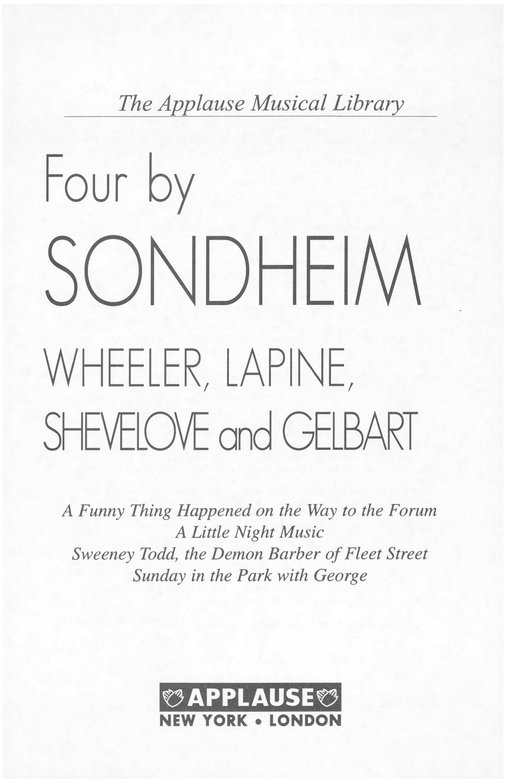THE APPLAUSE MUSICAL LIBRARY
A CHORUS LINE: The Book of the Musical Michael Bennett, James Kirkwood, Nicholas Dante and Edward Kleban CITY OF ANGELS Larry Gelbart, Cy Coleman and David Zippel THE FANTASTICKS Harvey Schmidt and Tom Jones A FUNNY THING HAPPENED ON THE WAY TO THE FORUM Music and Lyrics by Stephen Sondheim Book by Burt Shevelove and Larry Gelbart THE GREAT MOVIE MUSICAL TRIVIA BOOK Jeff Kurtti A LITTLE NIGHT MUSIC Music and Lyrics by Stephen Sondheim

Book by Hugh Wheeler THE LONGEST LINE Broadways Most Singular Sensation: A Chorus Line Gary Stevens and Alan George THE MUSICAL: A Look at the American Musical Theater Richard Kislan THE NEW YORK MUSICALS OF COMDEN & GREEN On the Town

Wonderful Town

Bells are Ringing SUNDAY IN THE PARK WITH GEORGE Music and Lyrics by Stephen Sondheim

Book by James Lapine SWEENEY TODD, The Demon Barber of Fleet Street Music and Lyrics by Stephen Sondheim

Book by Hugh Wheeler TITANIC: The Complete Book of the Musical Story and book by Peter Stone

Lyrics by Maury Yeston
Four by Sondheim, Wheeler, Lapine, Shevelove and Gelbart An anthology of musicals als published in individual volumes by Applause. Copyright 2000 by Applause Theatre & Cinema Books A FUNNY THING HAPPENED ON THE WAY TO THE FORUM Introduction Copyright 1991 by Applause Theatre Book Publishers. Copyright 1963 by Burt Shevelove, Larry Gelbart and Stephen Sondheim. Lyrics from musical compositions (except The House of Marcus Lycus), Copyright 1962 by Stephen Sondheim. The House of Marcus Lycus, Copyright 1963 by Stephen Sondheim. Burthen Music Company, Inc., owner of publication and allied rights throughout the world.
Lyrics used herein by permission of Burthen Music Company, Inc. All rights reserved. A LITTLE NIGHT MUSIC Introduction Copyright 1991 by Jonathan Tunick. Copyright 1973 by Hugh Wheeler, Stephen Sondheim and Harold S. Prince. Music and lyrics Copyright 1973 by Revelation Music Publishing Corp./Beautiful Music, Inc.
All rights reserved. SWEENEY TODD, The Demon Barber of Fleet Street Introduction 1991 by Applause Theatre Book Publishers. Libretto Copyright 1979 by Hugh Wheeler. Music and Lyrics Copyright 1978, 1979 by Revelation Music Publishing Corp. and Rilting Music, Inc. All rights reserved.
SUNDAY IN THE PARK WITH GEORGE Introduction Copyright 1991 by Applause Theatre Book Publishers. Book Copyright 1984 by James Lapine. Music and Lyrics Copyright 1984 by Stephen Sondheim, Revelation Music Publishing Corp. and Rilting Music, Inc. All rights reserved. CAUTION.
Professionals and amateurs are hereby warned that each play within is subject to a royalty. It is fully protected under the copyright laws of the United States of America, and of all countries covered by the International Copyright Union (including the Dominion of Canada and the rest of the British Commonwealth), and of all countries covered by the Pan-American Copyright Convention and the Universal Copyright Convention, and of all countries with which the United States has reciprocal copyright relations. All rights, including professional and amateur stage performing, motion picture, recitation, lecturing, public reading, radio broadcasting, television, video or sound taping, all other forms of mechanical or electronic reproduction, such as information storage and retrieval systems and photocopying, and the rights of translation into foreign languages, are strictly reserved. All inquiries concerning stock, amateur, second-class touring and foreign language stage performing rights should be directed to Music Theatre International, 545 Eighth Avenue, New York, N.Y. 10018. 10019. 10019.
Grateful acknowledgement is made to the following for permission to include their photographs and scene and costume designs: Van Williams, Zoe Dominic Photography, MGM/UA Communications Co., Center Theater Group of the Music Center of Los Angeles, Tony Walton, Concorde-New Horizons Corp./Wein Film Gmbh/Polygram Pictures, Martha Swope Associates/Carol Rosegg, Boris Aronson, Florence Klotz, Michael Anania, Lindsay W. Davis, Eugene Lee, Frannie Lee, Tony Straiges, Patricia Zipprodt and Ann Hould-Ward. Drawings by Hirschfeld Copyright 1962, 1971, 1973, 1979, 1984, 1989 by Al Hirschfeld and reproduced by special arrangement with Hirschfelds exclusive representative, the Margo Feiden Galleries Ltd., New York. Library of Congress Cataloging-in-Publication Data Library of Congress Card Number: 00-100279 British Cataloging-in-Publication Data A catalogue copy of this book is available from the British Library. APPLAUSE BOOKS 1841 Broadway
Suite 1100
New York, NY 10023
Phone (212) 765-7880
FAX (212) 765-7875 Combined Book Services
Units I/K Paddock Wood Dist. M. P.
INTRODUCTION
As a rule, authors suspect the quality of any work that is written quickly and rather painlessly.
INTRODUCTION
As a rule, authors suspect the quality of any work that is written quickly and rather painlessly.
A Funny Thing Happened on the Way to the Forum was never an object of that sort of suspicion. The only aspect of the project that ever came fast and free of any pain was the dialogue. Even when we lost our way in terms of plotting, and I cannot tell you how many man-hours (women- and children-hours, as well) we spent in a wilderness of our own creation, we were never at a loss for words, funny words, mostly-funny words, or words that led up to the funny words, or funny words that paved the way for even funnier words. (Lovers of modesty will find little to their liking in this foreword, since I have absolutely none to offer when it comes to Forum. Nearly thirty years after its first performance, and having, in the intervening period, written enough words to circle the globe and the Old Globe dozens of times, it remains for me the best piece of work Ive been lucky enough to see my name on.) Irwin Shaw once advised all writers, in order to withstand criticism from without and compromise from within, to be vain about their work. Until A Funny Thing Happened on the Way to the Forum , I confess there was little I had done that warranted any sort of vanity.
The initial idea to do the show was the late Burt Sheveloves. Burt had done an embryonic version of a Roman comedy in his university days and had long felt that a professional, full-blown Broadway production would have every chance of success. Although Burt and I had worked together on many television shows during the 1950s, we had never functioned before as a writing team. Burt produced and directed several comedy/variety shows that I had written in that period; working in separate capacities, we learned that we laughed at the same things and, happily, always at the same time. Our goal was to construct a musical comedy based on the style and spirit of the twenty-six surviving plays of Titus Maccius Plautus, the third-century Roman playwright, who invented all the devices of theatrical comedy, teaching amphitheater audiences up and down Caesars Circuit to laugh for the first time at character and situation instead of that old staple they found so amusing, bloodshed. Certainly, there was comedy in everyday life before Plautus set quill to parchment, but it was he who created comic conventions and made use of humorous wordplay within the discipline of well-made plays.

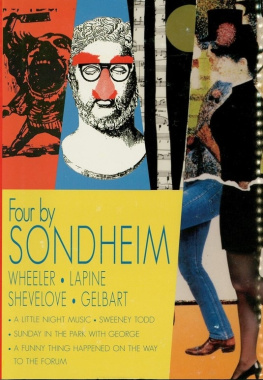
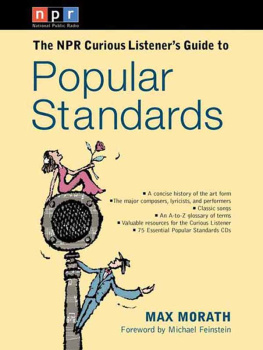
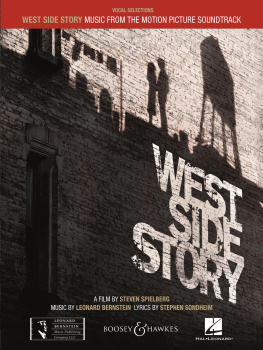
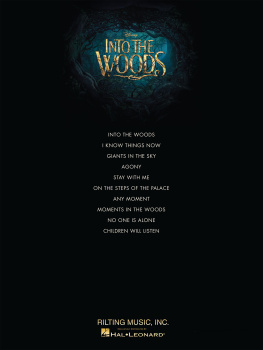
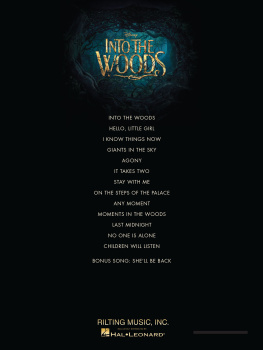
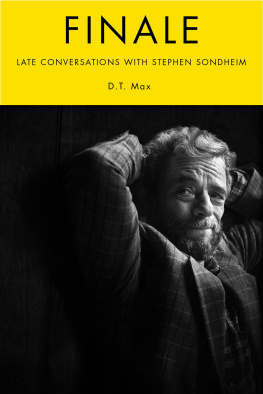
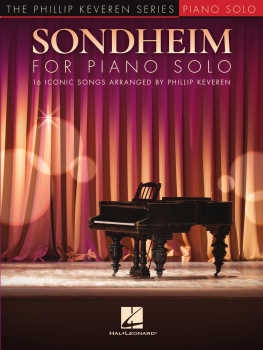
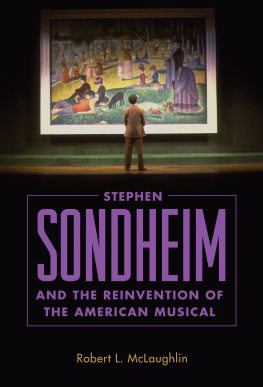

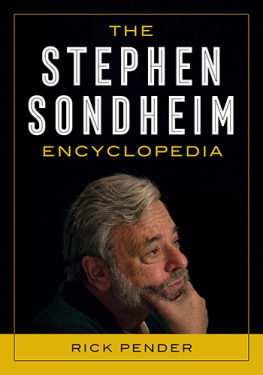
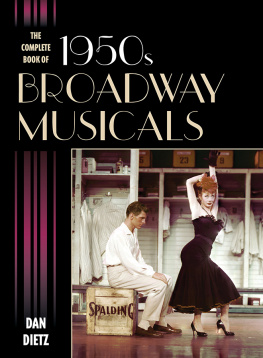
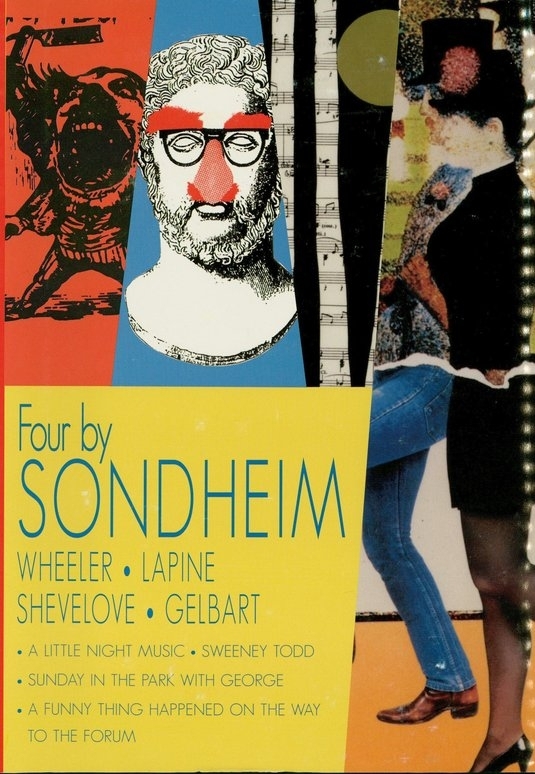
 Book by Hugh Wheeler THE LONGEST LINE Broadways Most Singular Sensation: A Chorus Line Gary Stevens and Alan George THE MUSICAL: A Look at the American Musical Theater Richard Kislan THE NEW YORK MUSICALS OF COMDEN & GREEN On the Town
Book by Hugh Wheeler THE LONGEST LINE Broadways Most Singular Sensation: A Chorus Line Gary Stevens and Alan George THE MUSICAL: A Look at the American Musical Theater Richard Kislan THE NEW YORK MUSICALS OF COMDEN & GREEN On the Town 